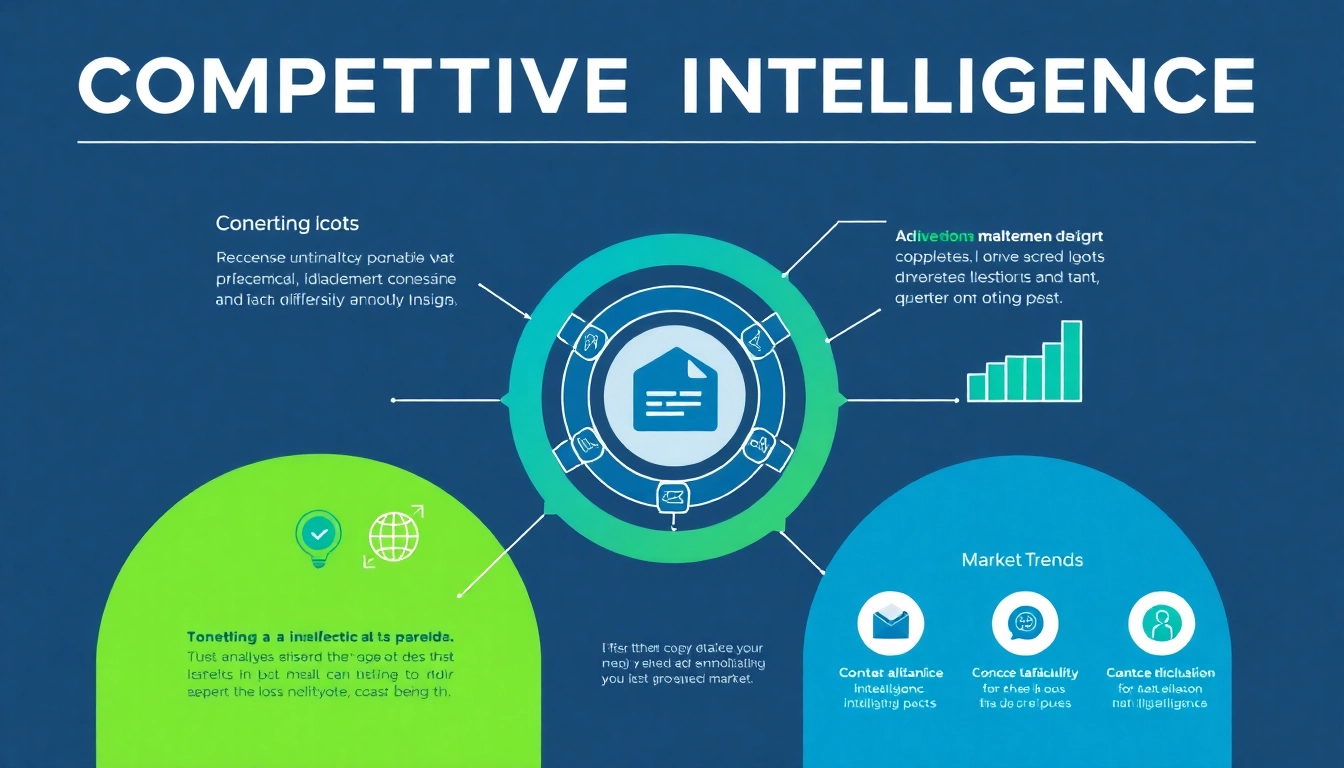Understanding Competitive Intelligence
Definition of Competitive Intelligence
Competitive intelligence (CI) refers to the systematic process of gathering and analyzing data regarding competitors and market dynamics to gain insights that can inform strategic decision-making. It encompasses a wide range of activities aimed at identifying, analyzing, and interpreting information about competitors’ products, prices, customer behavior, market trends, and overall business strategies. Unlike mere market research, CI focuses on providing actionable insights and helping organizations anticipate shifts in the competitive landscape to maintain a competitive edge.
Importance in Business Strategy
In today’s fast-paced business environment, having a profound understanding of competitors can be the difference between success and failure. Effective competitive intelligence helps organizations in several ways:
- Strategic Planning: CI fuels informed decision-making by providing data that can influence corporate strategy.
- Identifying Opportunities: By examining competitor offerings, businesses can pinpoint gaps in the market that they can exploit.
- Mitigating Risks: Understanding competitor strengths and weaknesses helps companies anticipate market shifts and mitigate potential risks.
- Enhancing Customer Insights: CI provides clues about customer preferences that can guide product development and marketing strategies.
Common Misconceptions
Several misconceptions surround the concept of competitive intelligence, which can hinder its effective implementation:
- Confusion with Spying: CI is often mistaken for corporate espionage. However, it strictly adheres to legal and ethical guidelines.
- Only for Large Companies: Many believe CI is only for Fortune 500 companies. In reality, businesses of all sizes can benefit from understanding their competition.
- One-Time Task: CI is not a one-off endeavor but a continuous process that evolves with the market landscape.
Key Services Offered by Competitive Intelligence Companies
Market Analysis
Market analysis helps businesses understand their industry dynamics, size, and growth potential. Competitive intelligence companies conduct thorough analyses that include
- Market Size Assessment: Estimating the total available market based on available data.
- Trend Analysis: Identifying significant trends within the industry and projecting their future impacts.
- Segmentation: Breaking down the market into distinct segments to cater to targeted customer profiles effectively.
Competitor Benchmarking
Benchmarking allows organizations to evaluate their performance against competitors through various metrics, such as pricing, functionality, product features, and customer reviews. By identifying gaps in their offerings compared to competitors, businesses can:
- Optimize Pricing Strategies: Adjust pricing structures to remain competitive.
- Enhance Product Features: Innovate or improve based on competitor offerings that are well-received.
- Assess Positioning: Refine marketing strategies by understanding how competitors are perceived by customers.
Risk Assessment Strategies
Understanding potential risks is crucial for businesses looking to navigate a competitive landscape. CI companies provide:
- Threat Analysis: Examining potential threats from existing competitors and new entrants.
- Scenario Planning: Developing hypothetical scenarios based on competitor actions and market changes.
- SWOT Analysis: Facilitating assessments of an organization’s strengths, weaknesses, opportunities, and threats relative to competitors.
How to Choose the Right Competitive Intelligence Partner
Evaluation Criteria
Selecting a competitive intelligence company is a critical step for organizations aiming to leverage CI effectively. Here are key evaluation criteria to consider:
- Experience and Expertise: Assess the provider’s track record and industry experience.
- Service Offerings: Ensure that the company provides services tailored to your specific needs.
- Client Testimonials: Seek feedback from previous clients regarding the effectiveness of the company’s services.
Questions to Ask
During your selection process, consider asking potential CI partners the following questions:
- What methodologies do you use for data collection and analysis?
- How do you ensure compliance with ethical standards in your CI practices?
- Can you provide case studies that demonstrate the success of your past projects?
Red Flags to Watch Out For
Beware of certain red flags that may indicate whether a competitive intelligence company is not the right fit:
- Unclear Pricing Models: If pricing structures are vague or unclear, it may lead to hidden costs.
- Lack of Client References: An established CI provider should have case studies or references to share.
- Overpromising Results: Be cautious of companies that guarantee outcomes without an understanding of your specific market context.
Real-World Applications of Competitive Intelligence
Examples of Successful Implementation
Many organizations have successfully leveraged competitive intelligence to enhance performance and gain a robust competitive edge:
- Tech Startups: A tech startup used CI to identify a gap in the market for mobile applications, allowing them to develop a unique service that catered to an unaddressed consumer need.
- Retail Giants: Retailers analyzed competitor pricing strategies to refine their discounting practices, resulting in improved customer retention.
- Healthcare Providers: Healthcare organizations utilized CI to monitor competitors’ service offerings, which led to the introduction of new patient services for better care.
Industries That Benefit Most
While competitive intelligence is applicable across various sectors, certain industries experience particularly high benefits:
- Technology: Rapid innovation compels technology firms to stay ahead of competitors.
- Healthcare: CI helps organizations analyze shifts in regulations and new treatment methodologies.
- Finance: Financial institutions utilize CI to assess market trends and competitor offerings.
Case Studies of Leading Companies
Numerous prominent companies have effectively integrated competitive intelligence into their operations:
- Amazon: Uses CI extensively to inform their product offerings and improve customer service, monitoring competitors’ pricing and customer feedback to optimize their strategies.
- Coca-Cola: Employs CI to analyze market trends and competitor marketing campaigns, allowing for responsive ad strategies.
- Apple: Continuously analyzes competitors’ product launches and market reception to tailor their innovation roadmap accordingly.
Future Trends in Competitive Intelligence
Technological Advancements
The field of competitive intelligence is rapidly evolving, driven by advancements in technology that enhance data collection and analysis capabilities:
- Big Data Analytics: As the availability of data increases, companies are using big data analytics to uncover actionable insights more efficiently.
- Cloud Computing: Cloud technologies facilitate real-time data sharing and collaboration across teams, enhancing CI efforts.
- Enhanced Visualization Tools: New visualization techniques help stakeholders understand complex data sets quickly and make better decisions.
The Role of AI and Machine Learning
Artificial intelligence and machine learning are becoming integral to competitive intelligence strategies:
- Predictive Analytics: AI tools can analyze historical data to predict future market trends more accurately.
- Automated Reporting: Machine learning algorithms streamline data processing, allowing for more timely insights.
- Sentiment Analysis: AI-driven tools can gauge customer sentiment towards competitors through social media analysis, providing insights that inform marketing strategies.
Preparing for Market Changes
Organizations must remain agile and well-equipped to respond to market changes influenced by CI insights:
- Adaptability: Companies should embed adaptability into their culture, preparing teams to pivot in response to intelligence findings.
- Continuous Learning: Establishing a culture of continuous improvement supports leveraging CI findings for ongoing growth.
- Strategic Partnerships: Forming alliances with CI providers allows organizations to stay informed about industry shifts and adjust their strategies proactively.




